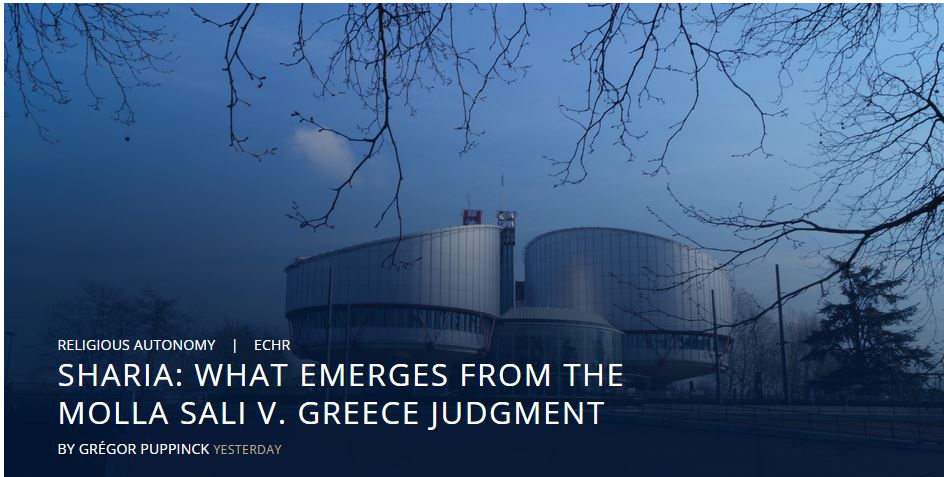The slippery slope of Islamization…
Intimidation, supremacist views, lack of freedom of choice are Islam’s core ideology tenents, failing to understand that will lead countries to eventual ruin.
The Court therefore chose an approach that is both liberal and communitarian, capable of accommodating the coexistence of diverse communities with legal privileges within the same state. This echoes the obligation, recently developed in the Austrian blasphemy case, “to ensure the peaceful co-existence of religious and non-religious groups and individuals under their jurisdiction by ensuring an atmosphere of mutual tolerance”. This approach gives rise to serious difficulties in its implementation.
First, it is based on the assumption of consent. The Court assumes that “the choice in question is completely free, provided it is informed”. However, as Muriel Fabre-Magnan has perfectly shown, in her recent essay The Institution of Freedom, consent is not enough to guarantee freedom. For example, it is not because a young Muslim woman agrees to marry a man chosen by her parents that her choice is free. Moreover, when we know how much Islam can constitute a closed society, there is reason to wonder about the true freedom to leave it, especially since the Sharia punishes apostasy with death. There is great hypocrisy in believing that consent is enough to guarantee freedom and perhaps also some cowardice.
SHARIA: WHAT EMERGES FROM THE MOLLA SALI V. GREECE JUDGMENT
Opinion published on 26 December 2018 in the Figaro Vox.
Does Sharia have its place in Europe? If so, under which conditions? These are the questions currently facing the bodies of the Council of Europe.
Up to the 18 December 2018, the European Court of Human Rights considered that Sharia law is, in its very principle, incompatible with the values of democracy and human rights. This is no longer the case today: the Court is now accepting its application in Europe under certain conditions, unfortunately unclear.
In 2003, the ECHR had validated the dissolution of an Islamist political party –despite its victory in the elections– on the grounds that it wanted to establish Sharia law in Turkey. The Strasbourg judges then concluded, bluntly, “that sharia is incompatible with the fundamental principles of democracy” and with the standards of the European Convention on Human Rights (Refah Partisi and Others v. Turkey, 13 February 2003).
Yet, in its Molla Sali v. Greece case, the Court failed to reiterate this condemnation in principle of sharia, and accepted its application on the margins of Greek common law.
This can be explained firstly by the fact that the application of sharia law in Greece is not new. Inherited from the Ottoman Empire, it continued to apply to Muslim populations under Greek jurisdiction after the recapture of Western Thrace. The treaties of Sèvres (1920) and Lausanne (1923) regulating after the War the fate of “minorities” in Turkey and Greece provided that they could continue to live according to their own customs. Thereafter, the Greek courts have held that Sharia law must apply to all members of the Muslim community of Thrace, in matters of marriage, divorce and succession.
This is what a woman is challenging before the European Court of Human Rights. The former, in fact, was deprived of most of the inheritance of her late husband because of the application of sharia law to her estate, even though he had chosen to bequeath to her his property, under common law. The Greek courts annulled the will, ruling that the Muslim couple had an obligation to settle the succession according to Sharia law, making it largely due to the sisters of the deceased. It was therefore unto the European Court to decide whether “the sacred Muslim law” can be applied forcibly to Greek nationals on the grounds, in particular, of the “protection of minorities” and the respect of the international commitments of Greece.
Unsurprisingly, the European Court has condemned this forced application of sharia … yet not Sharia law itself. Greece had anticipated this decision by making the use of sharia law and the mufti jurisdiction optional through a law of 15 January 2018.
More interestingly, and unnoticed by the press, the European Court took advantage of this case to lay down its conditions for the application of Sharia law in Europe.

